Jaques’ Happy Families
In 1851 the games manufacturer John Jaques of London (founded in 1795) commissioned a set of drawings from John Tenniel, later Sir John, the chief cartoonist of Punch, for their new game of Happy Families.
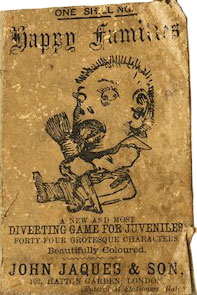
In 1851 the games manufacturer John Jaques of London (founded in 1795) commissioned a set of drawings from John Tenniel, later Sir John, the chief cartoonist of Punch, for their new game of Happy Families. The game was shown at the Great Exhibition of 1851 and was an instant success, soon superseding similar games such as John Bull or Dr Busby in which players also collected sets of four cards. Jaques' version of Happy Families remained popular until the Second World War, but was lucky to survive thereafter. In 1941, during the Blitz, a large bomb destroyed the Hatton Garden factory. However, a safe, which had been kept at the top of the building and had fallen through to the basement, yielded the charred remains of an old pattern book, which included the originals for all the firm's card games and one example of the Happy Families card game - Master Potts the Painter's son. Later the printing plates for the game were discovered intact and so Happy Families lived on.
Happy Families was first published by John Jaques in 1861. It was Jaques’ first card game and became a game to fill the leisure time of the Victorian family (Michael Thomson, 2022).
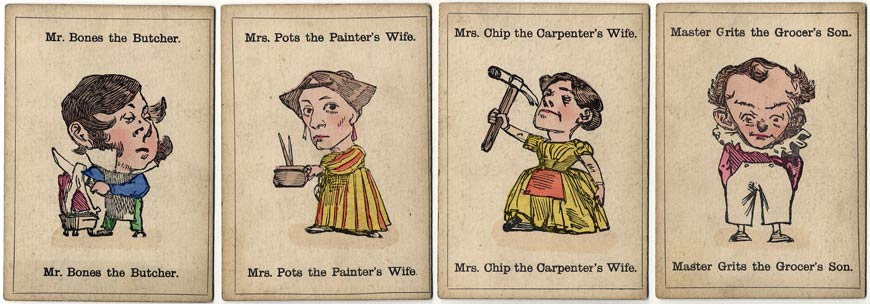
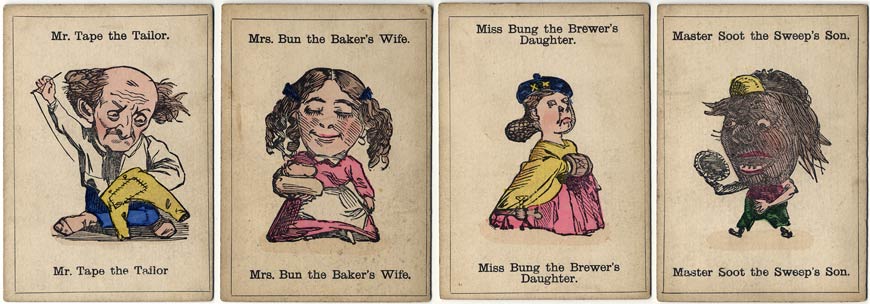
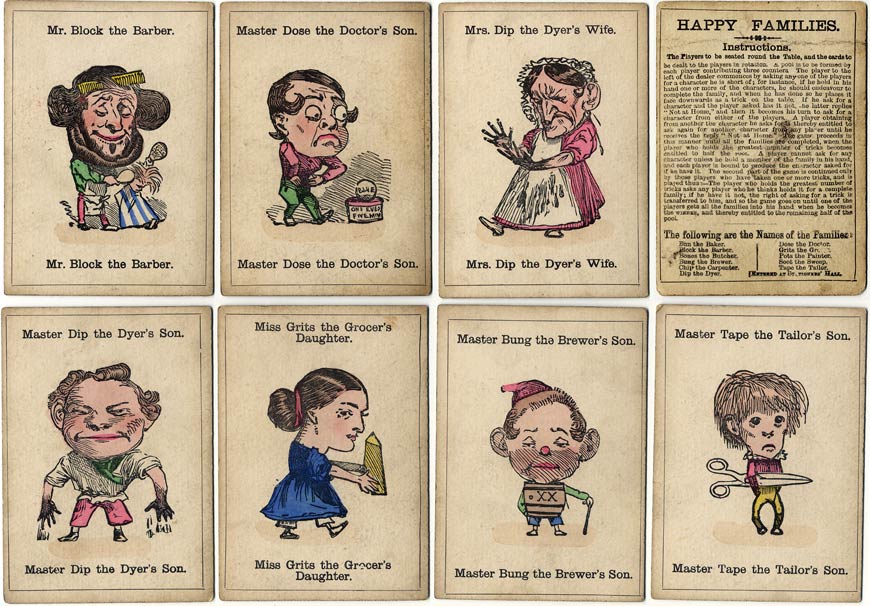
Above: cards from an 1880s edition of Happy Families published by John Jaques & Son, 102 Hatton Garden, London, which included 11 families of four members each. Stencil-coloured lithography. Jaques' Happy Families had been shwon in 1851 at the Great Exhibition of that year. It was an instant success, rapidly superseding similar games in which players collected sets of four cards, an idea possibly taken from early German models. Originally only eleven families, the game was expanded to twelve families by the addition of the Mug family, drawn by Miss Irene Dodson, the great niece of Charles Dodson (alias Lewis Caroll). This enabled the game to be produced in two half packs of six families each.

Tenniel's designs are an artisan crowd - even the doctor, the only professional among them, is reduced to 'Mr Dose'. They are also lower middle class and male orientated. Happy Families, which Tenniel drew 10 years before his illustrations for Alice in Wonderland, started a successful trend. Jaques was also one of the first games makers in England to market card games seriously. Jaques' original Happy Families designs were copied, sometimes with only slight modifications, by later manufacturers as recently as the 1970s, testifying to their enduring popularity. A miniature set was produced by Alfred Bird & Son in their custard powder packets just before WW2.
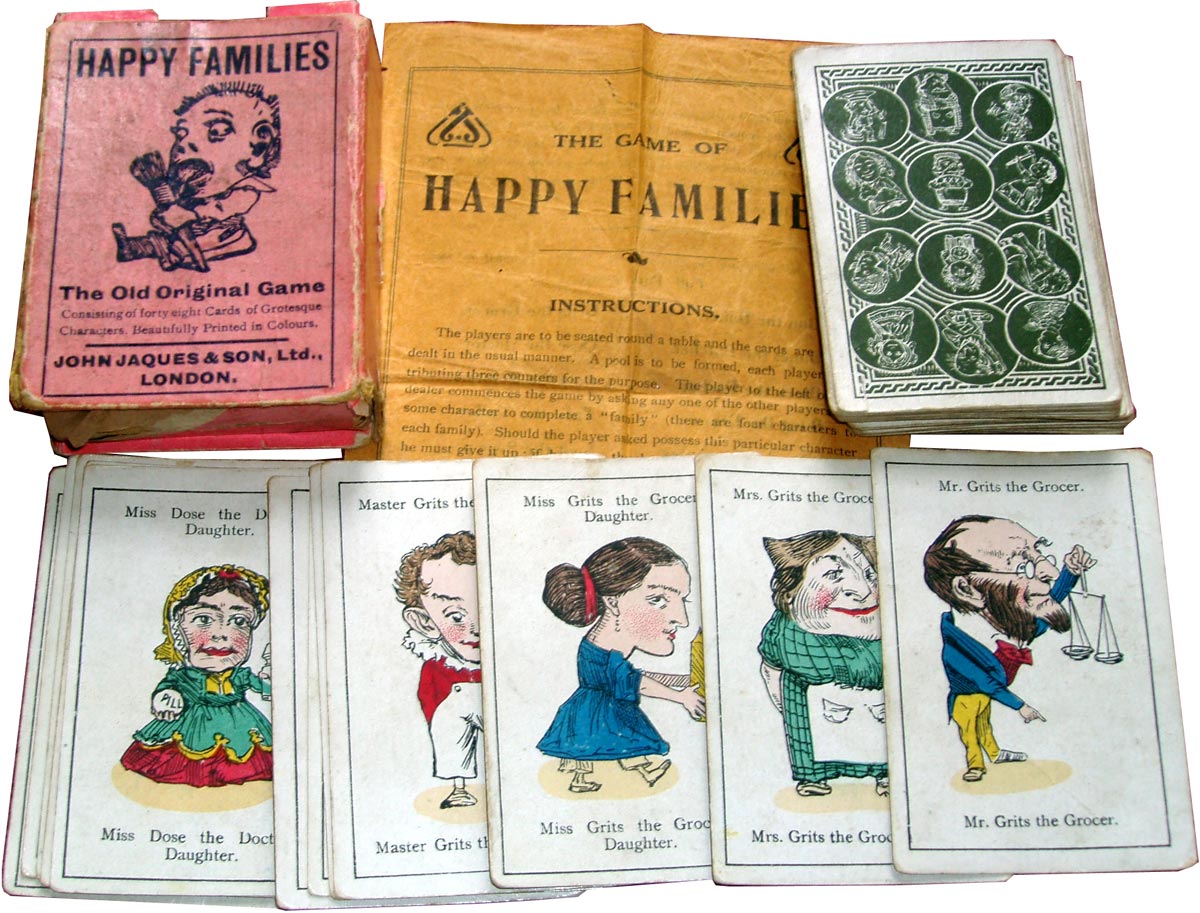
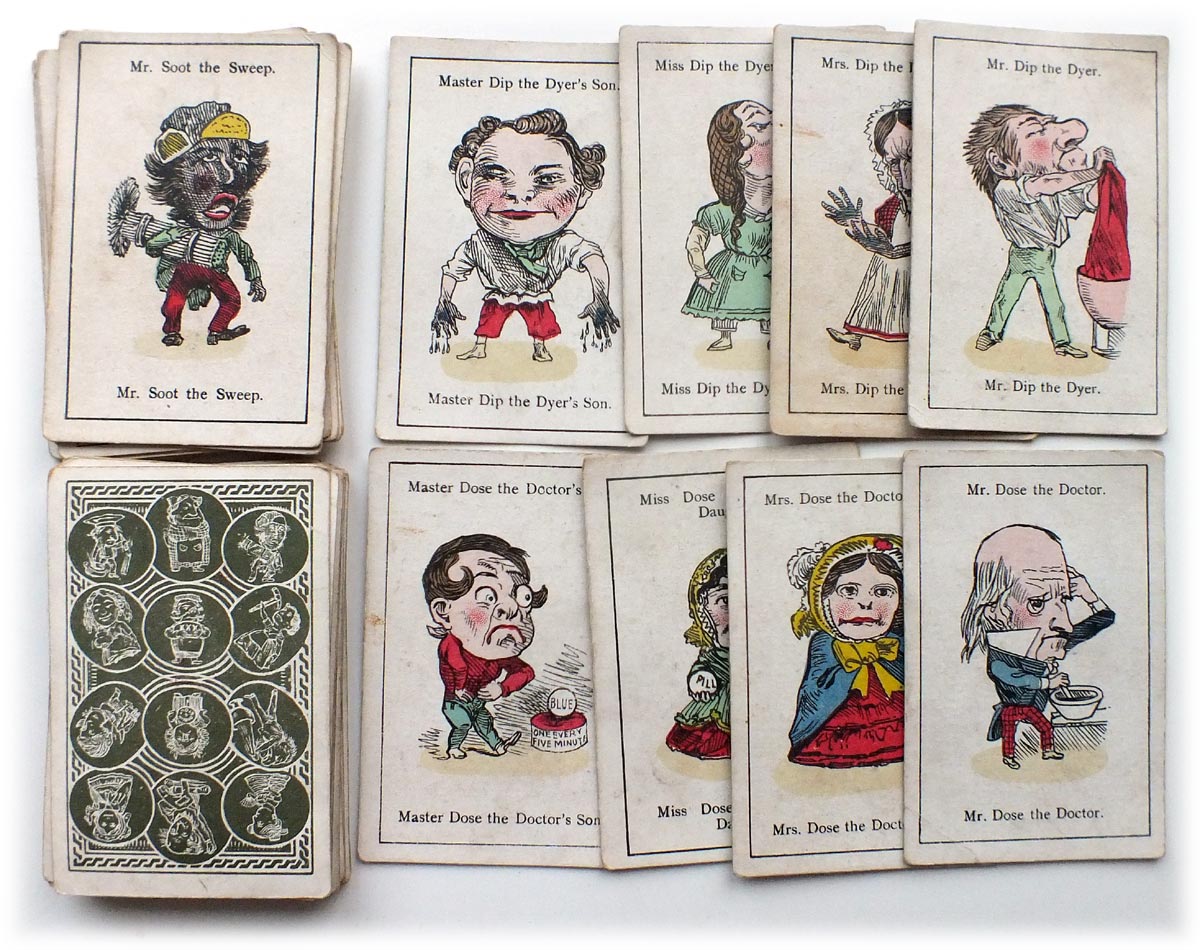
Above: 1910 edition of Happy Families published by John Jaques & Son, London.
Further References
Thomson, Michael: The Beginning of Happy Families in EPCS Newsletter issue 135, June 2022, pp.24-34.
Welsh, Donald: Happy Families... an old game with new faces, Newsletter of the English Playing Card Society, Vol.9 No.38, Nov.1992, pp.78-81.

By Simon Wintle
Member since February 01, 1996
I am the founder of The World of Playing Cards (est. 1996), a website dedicated to the history, artistry and cultural significance of playing cards and tarot. Over the years I have researched various areas of the subject, acquired and traded collections and contributed as a committee member of the IPCS and graphics editor of The Playing-Card journal. Having lived in Chile, England, Wales, and now Spain, these experiences have shaped my work and passion for playing cards. Amongst my achievements is producing a limited-edition replica of a 17th-century English pack using woodblocks and stencils—a labour of love. Today, the World of Playing Cards is a global collaborative project, with my son Adam serving as the technical driving force behind its development. His innovative efforts have helped shape the site into the thriving hub it is today. You are warmly invited to become a contributor and share your enthusiasm.
Related Articles

Historic Shakespeare
“Historic Shakespeare” playing cards featuring Shakespearean characters by Chas Goodall & Son.

Copechat Paramount Sorting System
Preserving the past: a specimen deck showcasing edge-notched cards and their ingenious sorting syste...

Heartsette by Herbert Fitch & Co, 1893
A glimpse into a busy print and design office in late Victorian London.

Rap Rummy
Rap Rummy made by Parker Brothers in 1926, only 4 years after the discovery of King Tutankhamen’s to...

Batman® playing cards
Batman playing cards published by InterCol of London 1989.

Can You Believe Your Eyes?
“Can You Believe Your Eyes?” playing cards featuring visual illusions & other oddities.

Pastime Playing Cards for the Blind
The “Pastime” Playing Cards for the Blind manufactured by Goodall & Son Limd., c.1910.

The European Interchanges Quartets
A card game based around motorway intersections from European countries.

Songs with Flute accompaniment
Eighteenth century English engraved cards with music for voice and flute.

Love Tests
Vintage novelty “Love Test” cards of a slightly saucy nature but all in good fun!

Briefmarken-Quartett
Quartet game featuring postage stamps from the Zones of Occupation in post-WWII Germany.

Ben 10 playing cards
Characters from the American animated television science fantasy series Ben 10.

Doctor Who Trump Card Game
Game for two players in which Doctor Who and the Legendary Legion join battle with the Alien Hordes....

Disney’s Aladdin playing cards
Characters from the 1992 Disney film Aladdin.

2011 Worshipful Company Pack
Celebrating the bicentenary of the birth of Charles Dickens, with characters adapted from drawings b...

Jockey Club de Buenos Aires
Spanish-suited pack by Chas Goodall & Son Ltd for the Jockey Club, Buenos Aires.
Most Popular
Our top articles from the past 28 days

